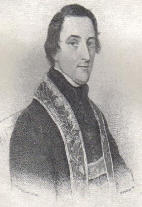Charles Constantine Pise

Charles Constantine Pise, SJ, (1801–1866)[1] was a Roman Catholic priest and writer.
Biography
Born in Annapolis, Maryland, "the son of an Italian father and a mother who came from an old Philadelphia family,"[2] he was educated at Georgetown College in Washington, D.C., entered the Society of Jesus, and was ordained in 1825.[1]
He also spent the years 1821-1822 at Mount St. Mary's College and Seminary in Emmitsburg, Maryland. During his stay there, his classmates included three future archbishops: John McCloskey, John Baptist Purcell, and John Hughes.[2]
He wrote several works in prose and verse, and was a distinguished lecturer and preacher.[1] Among his many literary works, he wrote three Catholic devotional novels and one semi-fictional work, Letters to Ada.[2] Between 1827 and 1830, he published a five-volume History of the Church from Its Establishment to the Present Century though the work stopped at the sixteenth century. In honor of this effort, Pope Gregory XVI made him a knight of the Sacred Palace and Count Palatine, "the first time these honors had come to an American." At this point, he was also made a knight of the Holy Roman Empire and was granted a Doctor of Divinity degree by examination.[2]
During these years, Pise was an assistant at St. Patrick's Church in Washington, DC.[2] Henry Clay arranged for him to be appointed Chaplain of the Senate for 1832-1833.[2] Pise was the first (and, to date, only) Roman Catholic United States Senate Chaplain, coming into that office on December 11, 1832.[1] Answering objections to the presence of a Catholic in such a prominent government role, and prefiguring a similar speech by John F. Kennedy more than 125 years later, on July 4, 1833, Pise made "an eloquent address" before the Maryland House of Delegates describing in what sense he felt an American Catholic owed 'allegiance' to the Pope.[2]
In 1849, he was assigned as rector at Saint Charles Borromeo Church in Brooklyn, New York; he died in Brooklyn on May 26, 1866.[3]
Appraisal
Pise had a career of such prominence that it was unusual he was not made a bishop. One biographer suggests that his friendship with Catholic intellectual Orestes Brownson may have been the problem, at a time when the American Church was turning away from intellectualism as a result of growing Irish domination. Alternatively, the same biographer suggests that it may have been an anti-Irish, anti-Jesuit streak in Ambrose Maréchal, Bishop of Baltimore, which led him to suppress this logical cap to Pise's career.[2]
See also
Bibliography
Partial list:[2]
- History of the Church from Its Establishment to the Present Century. (1827–1830)
- Father Rowland: a North American Tale. Baltimore: Fielding Lucas, Jr. (1829, 1831) Dublin: (1837, 1846)
(a response to the anti-Catholic novel Father Clement: A Roman Catholic Story by Grace Kennedy, published in 1823)
- The Indian Cottage, a Unitarian Story. Baltimore: Fielding Lucas, Jr. (1831)
- The Pleasures of Religion and Other Poems. (1833) (dedicated to Washington Irving)
- Letters to Ada, From Her Brother-In-Law. Harper and Brothers (1834)
- Zenosius; or The Pilgrim Convert. New York: Edward Dunigan (1845) (his last novel)
- Christianity and the Church. (1850)
- First Flow'ret of the Desert Wild (1851) [hymn for Saint Rose of Lima].
- Let the Deep Organ Swell the Lay (1851) [hymn for Saint Cecilia].
—Both hymns are in the "Appendix" to the 1851 New York edition of Edward Caswall's Lyra Catholica, pp. 422, 427.—
References
- ^ a b c d Herbermann, Charles, ed. (1913). . Catholic Encyclopedia. New York: Robert Appleton Company.
- ^ a b c d e f g h i Thorp, Willard. Catholic Novelists in Defense of Their Faith, 1829-1865. New York: Arno Press, A New York Times Company (1978) A single volume in the complete set The American Catholic Tradition, ISBN 0-405-10862-1.
- ^ "Pise, Charles Constantine", in John Julian (1907), A Dictionary of Hymnology, reprint, New York: Dover, Vol. 2, p. 1687.
Further reading
- Brann, Rev. Henry A. Rev. Charles Constantine Pise, The Only Chaplain in the Congress of the United States in Historical Records and Studies Vol. II: 354-357 (1901).
- Julian, John (1907/1957), A Dictionary of Hymnology, reprint, New York: Dover.
- Moffat, Sister M. Eulalia Teresa. Charles Constantine Pise, chapter in Historical Records and Studies, United States Catholic Historical Society Vol.XX:64-98 (1931).
- Purcell, Richard J. DAB (Dictionary of American Biography, year and volume number unknown).
